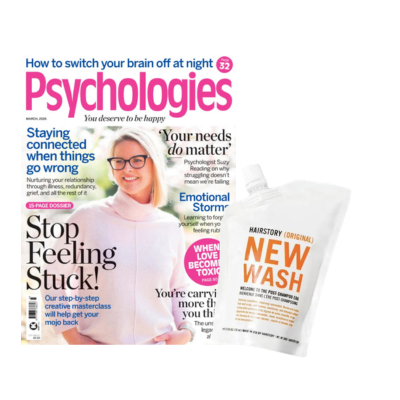Learn to accept yourself as you are
Isabelle Taubes explores the complex layers of self-image and learns that we should accept ourselves as we are

The relationship we have with our body is constantly fluctuating between love, rejection and acceptance. Every morning when we look in the mirror, we see something different. If we’ve had a night of tender caresses with a lover, we might see a desirable body. After a bad night’s sleep the mirror is merciless – bags, wrinkles, bad skin…
Our relationship with our own reflection is wracked with insecurity. One critical look can make us feel like an unattractive blob, while a seductive smile can reassure us and put a spring in our step.
‘We attach enormous importance to our appearance,’ says psychotherapist Didier Prades, ‘but it’s impossible to see ourselves as a whole. Our vision of ourselves is inevitably fragmented.’ This is why we expose ourselves to merciless examinations in which each body part is scrutinised and judged as a separate entity: ‘I like my shoulders but not my thighs, my stomach’s all right but my bottom’s terrible.’
‘There is no such thing as a body that can simply be,’ says Susie Orbach, in her book Bodies. Orbach, author of the seminal Fat Is A Feminist Issue, examines how we judge our bodies by external standards in a way that makes our relationship with them riven with dissatisfaction. ‘Disguised as preoccupation, health concern or moral endeavour, almost everyone has a rhetoric about trying to do right by their body, which reveals a concern that the body is not all right as it is and that the body is a suitable, indeed an appropriate, focus for our malaise, aspiration and energy.’
Our intolerance of what we perceive as imperfections is partly caused by the desire for a slim, firm body, but that certainly isn’t the whole story. Our relationship with our bodies is fraught with difficulty because the image we have of ourselves usually bears no relation to reality. ‘At 16, I felt like a skinny little nobody,’ says Helen, 52. ‘This was basically because my mother constantly told me that’s what I was. Then, just before I left for my first holiday by myself, my father said, “Watch out for the boys! A pretty girl like you – they won’t leave you alone.” I was astonished. After that I started to see myself differently. And naturally I threw myself into the arms of the first boy who paid me any attention. When I look back at photos from that period, I can see that actually I was lovely and not a tragic skeleton as my mother had always implied.’
Someone suffering from anorexia sees themself as enormous even though they are skeletal, and someone suffering from body dysmorphia is constantly discovering new monstrosities that only they can see. What is the demon that dominates the way we perceive ourselves and our relationship with our bodies? Freud called it the ‘ego-ideal’, and its role is to manage our relationship with all that we would like to be and do. We love ourselves according to how we measure up to our ideal of perfection.
The higher we set the bar, the greater the risk that we’ll feel we’ve let ourselves down. Someone with an uncompromising ego-ideal believes that to be lovable they must look like a supermodel, so it’s inevitable that they feel unattractive as they are. Adolescents may be prone to anorexia, and their lives will be punctuated by long periods of dieting. Orbach points out that comparing our bodies to an ideal makes us more likely to fall short, and even fall ill.
‘While we demand more rigour and have high expectations of what the fit, healthy and beautiful body can deliver for us, there is an increase in symptoms, from sexual dissatisfactions to eating problems and fear of ageing,’ she says. If we had a good relationship with our family from early on, we may develop an ego-ideal so flexible and forgiving that we won’t become obsessed with what we lack. We may understand that, for example, having a big nose does not make us contemptible, or that we can be a good person without needing to be the centre of attention. Our ego-ideal is based on our parents’ perception of us, their demands and their hopes.
‘My mother worshipped me,’ says Michael, 55. ‘In her eyes I was the most beautiful boy in the world. Even if in reality I am no Greek god, I never doubted my appeal. I recently married a beautiful woman 20 years younger than me.’
‘Someone with a far from perfect physique, who felt validated during their childhood, can still feel confident in their appearance,’ says Prades. ‘It’s the power of love.’ If we were surrounded by love as children, would our self-esteem be assured for life? That would be far too simple. A father, disappointed that his teenage daughter is no longer the adorable little thing she was at 10 years old, may treat her more coolly and as a result she may start to think that she’s become repulsive. A mother, dismayed at her own ageing, is full of insecurities and can be just as destructive.
‘My mother was so anxious about getting old, she couldn’t cope with my growing up,’ remembers Marie, 39. ‘Whenever she gave me a compliment, she would immediately undermine it, so she would say something like, “You have nice legs, but at your age, mine were thinner”. She couldn’t help herself. Maybe that’s why I have no confidence in my own body.’
But as well as conscious emotions, such as love and hate, subconscious desires can be very powerful. ‘If they were expecting a son but they had a daughter, parents will be disappointed, albeit subconsciously. Even if they give masses of love to their little girl, she won’t be able to avoid thinking that her body is inadequate,’ says psychoanalyst Françoise Dupin.
Very often the issues we have with our self-image are the result of family conflict. We might grow to hate the features that link us to a family we would rather disown. But by the same token we might be proud of an awful nose because it reminds us of our adored grandfather. ‘Other children used to tease me about my “monkey mouth”,’ says Marion, 38, ‘but I never had a complex because my father would say, “They are just stupid; big lips are beautiful”.’
Loving words, however rarely offered, are the key to overcoming bullying or rejection. But what can we do when we feel as though no positive words were ever said to us? There are therapies that help us to accept ourselves. ‘Even those who are convinced that they don’t love themselves at all will have a tiny bit of self-love. It is always possible to build on that,’ says Prades. ‘At any time, we have the choice between whether to sink further into self-hatred or to force ourselves to grab hold of the safety mechanisms that our psyche offers.’
More inspiration:
Read Be your own woman by Jane C Woods on LifeLabs









